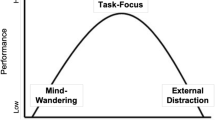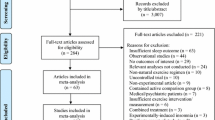Abstract
Rationale
Caffeine typically produces positive effects on mood and performance. However, tolerance may develop following habitual use, and abrupt cessation can result in withdrawal symptoms, such as fatigue. This study investigated whether caffeine has a greater stimulant effect in a withdrawn state compared to a normal caffeinated state, among moderate daily caffeine consumers.
Materials and methods
Using a within-subjects design, 17 caffeine consumers (mean ± sd = 375 ± 101 mg/day) ingested placebo or caffeine (250 mg) following 30-h of caffeine abstention or normal dietary caffeine use on four separate days. Self-reported mood and performance on choice reaction time, selective attention, and memory tasks were measured.
Results
Caffeine had a greater effect on mood and choice reaction time in the abstained state than in the normal caffeinated state, but caffeine improved selective attention and memory in both states.
Conclusions
Although improvements in mood and reaction time may best explained as relief from withdrawal symptoms, other performance measures showed no evidence of withdrawal and were equally sensitive to an acute dose of caffeine in the normal caffeinated state.




Similar content being viewed by others
References
Addicott MA, Yang LL, Peiffer AM, Laurienti PJ (2009) Methodological considerations for the quantification of self-reported caffeine use. Psychopharmacology 203:571–578
Childs E, de Wit H (2006) Subjective, behavioral, and physiological effects of acute caffeine in light, nondependent caffeine users. Psychopharmacology 185:514–523
Chou DT, Khan S, Forde J, Hirsh KR (1985) Caffeine tolerance: behavioral, electrophysiological and neurochemical evidence. Life Sci 36:2347–2358
Christopher G, Sutherland D, Smith A (2005) Effects of caffeine in non-withdrawn volunteers. Hum Psychopharmacol Clin Exp 20:47–53
Dager SR, Layton ME, Strauss W, Richards TL, Heide A, Friedman SD, Artru AA, Hayes CE, Posse S (1999) Human brain metabolic response to caffeine and the effects of tolerance. Am J Psychiatry 156:229–237
Deroche GM, Portz BS, Rector WG, Everson GT (1990) Simultaneous determination of caffeine and antipyrine in plasma and saliva using high-performance liquid-chromatography. J Liq Chromatogr 13:3493–3505
Eriksen BA, Eriksen CW (1974) Effects of noise letters upon the identification of a target letter in a nonsearch task. Percept Psychophys 16:143–149
Evans SM, Griffiths RR (1992) Caffeine tolerance and choice in humans. Psychopharmacology (Berl) 108:51–59
Evans SM, Griffiths RR (1999) Caffeine withdrawal: a parametric analysis of caffeine dosing conditions. J Pharmacol Exp Ther 289:285–294
Ferre S (2008) An update on the mechanisms of the psychostimulant effects of caffeine. J Neurochem 105:1067–1079
Fillmore M, Vogelsprott M (1992) Expected effect of caffeine on motor performance predicts the type of response to placebo. Psychopharmacology 106:209–214
Fine BJ, Kobrick JL, Lieberman HR, Marlowe B, Riley RH, Tharion WJ (1994) Effects of caffeine or diphenhydramine on visual vigilance. Psychopharmacology 114:233–238
Finn IB, Holtzman SG (1986) Tolerance to caffeine-induced stimulation of locomotor activity in rats. J Pharmacol Exp Ther 238:542–546
Foreman N, Barraclough S, Moore C, Mehta A, Madon M (1989) High doses of caffeine impair performance of a numerical version of the Stroop task in men. Pharmacol Biochem Behav 32:399–403
Frewer LJ, Lader M (1991) The effects of caffeine on two computerized tests of attention and vigilance. Hum Psychopharmacol 6:119–128
Green RM, Stiles GL (1986) Chronic caffeine ingestion sensitizes the A1 adenosine receptor-adenylate cyclase system in rat cerebral cortex. J Clin Invest 77:222–227
Griffiths RR, Woodson PP (1988) Caffeine physical dependence: a review of human and laboratory animal studies. Psychopharmacology 94:437–451
Griffiths RR, Evans SM, Heishman SJ, Preston KL, Sannerud CA, Wolf B, Woodson PP (1990) Low-dose caffeine physical dependence in humans. J Pharmacol Exp Ther 255:1123–1132
Haskell CF, Kennedy DO, Wesnes KA, Scholey AB (2005) Cognitive and mood improvements of caffeine in habitual consumers and habitual non-consumers of caffeine. Psychopharmacology 179:813–825
Heatherley SV, Hayward RC, Seers HE, Rogers PJ (2005) Cognitive and psychomotor performance, mood, and pressor effects of caffeine after 4, 6 and 8 h caffeine abstinence. Psychopharmacology (Berl) 178:461–470
Hewlett P, Smith A (2006) Acute effects of caffeine in volunteers with different patterns of regular consumption. Hum Psychopharmacol 21:167–180
Hewlett P, Smith A (2007) Effects of repeated doses of caffeine on performance and alertness: new data and secondary analyses. Hum Psychopharmacol 22:339–350
Holland DT, Godfredsen KA, Page T, Conner JD (1998) Simple high-performance liquid chromatography method for the simultaneous determination of serum caffeine and paraxanthine following rapid sample preparation. J Chromatogr B Analyt Technol Biomed Life Sci 707:105–110
Hughes JR, Oliveto AH, Bickel WK, Higgins ST, Badger GJ (1993) Caffeine self-administration and withdrawal: incidence, individual differences and interrelationships. Drug Alcohol Depend 32:239–246
James JE (1994) Does caffeine enhance or merely restore degraded psychomotor performance. Neuropsychobiology 30:124–125
James JE (1998) Acute and chronic effects of caffeine on performance, mood, headache, and sleep. Neuropsychobiology 38:32–41
James JE, Rogers PJ (2005) Effects of caffeine on performance and mood: withdrawal reversal is the most plausible explanation. Psychopharmacology (Berl) 182:1–8
James JE, Gregg ME, Kane M, Harte F (2005) Dietary caffeine, performance and mood: enhancing and restorative effects after controlling for withdrawal reversal. Neuropsychobiology 52:1–10
Johansson B, Georgiev V, Lindstrom K, Fredholm BB (1997) A1 and A2A adenosine receptors and A1 mRNA in mouse brain: effect of long-term caffeine treatment. Brain Res 762:153–164
Judelson DA, Armstrong LE, Sokmen B, Roti MW, Casa DJ, Kellogg MD (2005) Effect of chronic caffeine intake on choice reaction time, mood, and visual vigilance. Physiol Behav 85:629–634
Juliano LM, Griffiths RR (2004) A critical review of caffeine withdrawal: empirical validation of symptoms and signs, incidence, severity, and associated features. Psychopharmacology (Berl) 176:1–29
Kaplan GB, Greenblatt DJ, Ehrenberg BL, Goddard JE, Cotreau MM, Harmatz JS, Shader RI (1997) Dose-dependent pharmacokinetics and psychomotor effects of caffeine in humans. J Clin Pharmacol 37:693–703
Koppelstaetter F, Poeppel TD, Siedentopf CM, Ischebeck A, Verius M, Haala I (2008) Does caffeine modulate verbal working memory processes? An fMRI study. Neuroimage 39:492–499
Landrum RE (1992) College students' use of caffeine and its relationship to personality. Coll Stud J 26:151–155
Laurienti PJ, Field AS, Burdette JH, Maldjian JA, Yen YF, Moody DM (2002) Dietary caffeine consumption modulates fMRI measures. Neuroimage 17:751–757
Lieberman HR, Wurtman RJ, Emde GG, Roberts C, Coviella IL (1987) The effects of low doses of caffeine on human performance and mood. Psychopharmacology (Berl) 92:308–312
Loke WH, Meliska CJ (1984) Effects of caffeine use and ingestion on a protracted visual vigilance task. Psychopharmacology 84:54–57
Lorist MM, Snel J (1997) Caffeine effects on perceptual and motor processes. Electroencephalogr Clin Neurophysiol 102:401–413
Lotshaw SC, Bradley JR, Brooks LR (1996) Illustrating caffeine's pharmacological and expectancy effects utilizing a balanced placebo design. J Drug Educ 26:13–24
Mednick SC, Cai DJ, Kanady J, Drummond SPA (2008) Comparing the benefits of caffeine, naps and placebo on verbal, motor and perceptual memory. Behav Brain Res 193:79–86
Mitchell SH, Dewit H, Zacny JP (1995) Caffeine withdrawal symptoms and self-administration following caffeine deprivation. Pharmacol Biochem Behav 51:941–945
Nehlig A (1999) Are we dependent upon coffee and caffeine? A review on human and animal data. Neurosci Biobehav Rev 23:563–576
Nehlig A, Daval JL, Boyet S, Vert P (1986) Comparative effects of acute and chronic administration of caffeine on local cerebral glucose utilization in the conscious rat. Eur J Pharmacol 129:93–103
Patwardhan RV, Desmond PV, Johnson RF, Schenker S (1980) Impaired elimination of caffeine by oral-contraceptive steroids. J Lab Clin Med 95:603–608
Phillips-Bute BG, Lane JD (1997) Caffeine withdrawal symptoms following brief caffeine deprivation. Physiol Behav 63:35–39
Posthuma D, Mulder EJ, Boomsma DI, de Geus EJ (2002) Genetic analysis of IQ, processing speed and stimulus-response incongruency effects. Biol Psychol 61:157–182
Powell KR, Luvone PM, Holtzman SG (2001) The role of dopamine in the locomotor stimulant effects and tolerance to these effects of caffeine. Pharm Biochem Behav 69:59–70
Richardson NJ, Rogers PJ, Elliman NA, O'Dell RJ (1995) Mood and performance effects of caffeine in relation to acute and chronic caffeine deprivation. Pharmacol Biochem Behav 52:313–320
Robelin M, Rogers PJ (1998) Mood and psychomotor performance effects of the first, but not of subsequent, cup-of-coffee equivalent doses of caffeine consumed after overnight caffeine abstinence. Behav Pharmacol 9:611–618
Rogers PJ (2007) Caffeine, mood and mental performance in everyday life. Nutr Bull 32:84–89
Rogers PJ, Dernoncourt C (1998) Regular caffeine consumption: a balance of adverse and beneficial effects for mood and psychomotor performance. Pharmacol Biochem Behav 59:1039–1045
Rogers PJ, Martin J, Smith C, Heatherley SV, Smit HJ (2003) Absence of reinforcing, mood and psychomotor performance effects of caffeine in habitual non-consumers of caffeine. Psychopharmacology 167:54–62
Rogers PJ, Heatherley SV, Hayward RC, Seers HE, Hill J, Kane M (2005) Effects of caffeine and caffeine withdrawal on mood and cognitive performance degraded by sleep restriction. Psychopharmacology 179:742–752
Rubenstein KE, Schneider RS, Ullman EF (1972) Homogenous enzyme immunoassay: a new immunochemical technique. Biochem Biophys Res Commun 47:846–851
Ruxton CHS (2008) The impact of caffeine on mood, cognitive function, performance and hydration: a review of benefits and risks. Nutr Bull 33:15–25
Shi D, Daly JW (1999) Chronic effects of xanthines on levels of central receptors in mice. Cell Mol Neurobiol 19:719–732
Sigmon SC, Herning RI, Better W, Cadet JL, Griffiths RR (2009) Caffeine withdrawal, acute effects, tolerance, and absence of net beneficial effects of chronic administration: cerebral blood flow velocity, quantitative EEG, and subjective effects. Psychopharmacology. 204(4):573–85
Smith A (2002) Effects of caffeine on human behavior. Food Chem Toxicol 40:1243–1255
Smith A, Sutherland D, Christopher G (2005) Effects of repeated doses of caffeine on mood and performance of alert and fatigued volunteers. J Psychopharmacology 19:620–626
Streufert S, Pogash R, Miller J, Gingrich D, Landis R, Lonardi L, Severs W, Roache JD (1995) Effects of caffeine deprivation on complex human functioning. Psychopharmacology 118:377–384
Varani K, Portaluppi F, Merighi S, Ongini E, Belardinelli L, Borea PA (1999) Caffeine alters A2A adenosine receptors and their function in human platelets. Circulation 99:2499–2502
Warburton DM, Bersellini E, Sweeney E (2001) An evaluation of a caffeinated taurine drink on mood, memory and information processing in healthy volunteers without caffeine abstinence. Psychopharmacology 158:322–328
Warburton DM (1995) Effects of caffeine on cognition and mood without caffeine abstinence. Psychopharmacology (Berl) 119:66–70
Yeomans MR, Ripley T, Davies LH, Rusted JM, Rogers PJ (2002) Effects of caffeine on performance and mood depend on the level of caffeine abstinence. Psychopharmacology (Berl) 164:241–249
Acknowledgments
We would like to thank the General Clinical Research Center for their assistance with the collection of data.
Author information
Authors and Affiliations
Corresponding author
Additional information
Supported by grants from the National Institutes of Health (National Institute of Biomedical Imaging and Bioengineering: R01 EB03880 and National Institute on Drug Abuse: F31 DA024950).
Rights and permissions
About this article
Cite this article
Addicott, M.A., Laurienti, P.J. A comparison of the effects of caffeine following abstinence and normal caffeine use. Psychopharmacology 207, 423–431 (2009). https://doi.org/10.1007/s00213-009-1668-3
Received:
Accepted:
Published:
Issue Date:
DOI: https://doi.org/10.1007/s00213-009-1668-3




